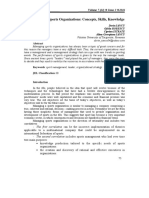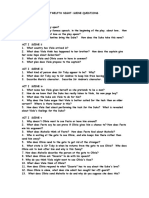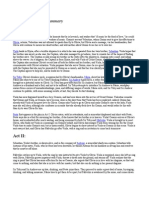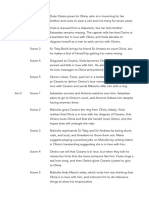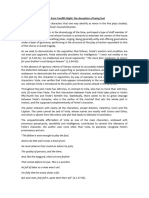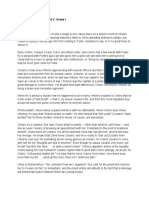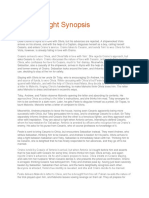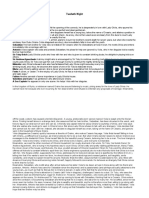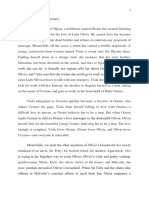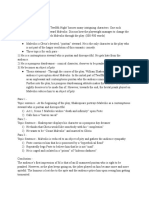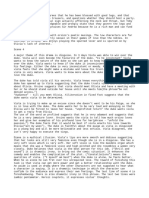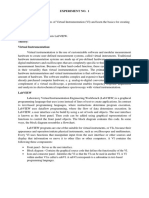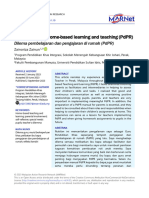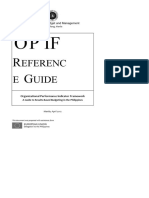Summary Analysis Themes
Uploaded by
Ayana404Summary Analysis Themes
Uploaded by
Ayana404Summary
Analysis
Themes
Back at Olivias house, Maria and Toby have locked Malvolio in a dark chamber to cure his madness. Outside the chamber, Maria instructs Feste to put on a gown and beard she has procured and to pretend to be a great scholar (4.2.10), Sir Topas. Maria goes to fetch Sir Toby while Feste puts on the gown. When they return, Sir Toby is delighted: the knave, he says, counterfeits well (4.2.19). The subplot of the prank on Malvolio is coming to a peak. Costume changes and role playing on stage also create another play-within-the-play, drawing attention to the theme of performance. Sir Topas goes to the door of Malvolios cell. Malvolio tries desperately to enlist him as an ally; Sir Topas parries his every attempt, telling him that the dark room he is in is really light as day. Malvolio begs Sir Topas to test whether or not he is mad by asking him a question. Sir Topas asks, *W+hat is the opinion of Pythagoras concerning wild fowl? Malvolio replies (correctly) that Pythagoras argued that the human soul might just as well inhabit the body of a bird. Sir Topas asks what Malvolio thinks of this; Malvolio (who, we will recall, is a Puritan) says that he thinks nobly of the soul and does not in any way approve of Pythagoras opinion. Sir Topas replies that Malvolio must remain in the darkness then: he will not be let out until he believes that a human soul could just as well inhabit the body of a bird. With this Sir Topas leaves Malvolio, who cries out after him. Sir Topas question about Pythagoras is pseudo-intellectual, thus parodying Malvolios pretentiousness. Yet Festes Q&A with Malvolio also reflects the themes of inconstant love and changing identity. Over the course of the play, the powerful love that Orsino and Olivia claim to feel is directed at so many different people that it becomes meaninglessit might as well be aimed at a bird. Similarly, Sebastian and Viola/Cesarios identities are also confused multiple times, raising questions about the constancy of a soul or of ones internal nature. If a mere disguise can transform Viola into a man, why cant her soul inhabit a bird? Sir Toby, amused, mocks Malvolios desperate cries. But he confides in Maria that they must find a way out of this prank to avoid irritating Olivia any further. The two sneak off to Sir Tobys bedroom. Here, in a rather unromantic off-stage culmination of the low plot, Toby and Maria get together. Back in his clown personality, Feste returns to Malvolios cell. Malvolio begs Feste to bring him a candle, pen, ink, and paper, so that he can write a letter asking Olivia for help. Feste agrees to deliver the letter, but first dallies for a while, teasing Malvolio. The spectacle of the servant teasing his superior is precisely what took place on the Twelfth Night holiday (see Background Info for more on this holiday).
Act IV, scenes iiii 1
Summary: Act IV, scene i Near Olivias house, Feste the clown comes across the person who he thinks is Cesario and tries to bring him to Olivias house. This individual, however, is actually Violas twin brother, Sebastian. Sebastian, of course, is confused by Festes claims to know him. Sir Toby and Sir Andrew then find t hem. Sir Andrew, thinking that Sebastian is the same person he was about to duel a few minutes before, attacks him. But Sebastian, unlike Viola, is a scrappy fighter, and starts to beat Sir Andrew with his dagger, leading the foolish nobleman to cry for mercy. The bewildered Sebastian wonders if he is surrounded by madmen and tries to leave. But Sir Toby grabs him to prevent him from going. The two exchange insults, and Sebastian and Sir Toby draw their swords and prepare to fight. Suddenly, Olivia enters. She sees Sir Toby preparing to fight the person who she thinks is Cesario. Angrily, she orders Sir Toby to put away his sword and sends away all the others. She begs Cesario to come into her house with her. Sebastian is bewildered, but Olivia does not give him time to think, and the still-confused Sebastian agrees to follow her, saying, If it be thus to dream, still let me sleep! (IV.i.59). Summary: Act IV, scene ii Inside Olivias house, Maria, Sir Toby, and the other servants have locked Malvolio into a small, dark chamber. Maria asks Feste to put on the robes of a clergyman and pretend to be Sir Topas, a fictional curate, or priest. Sir Toby and Maria then send Feste to talk to the imprisoned Malvolio in the voice of Sir Topas while they listen in on the conversation. Pretending to be the priest, Feste addresses Malvolio, who cannot see him inside his prison. Malvolio tells Feste that he is not insane, and Malvolio begs Feste to get him out of the locked room. But Feste deliberately misunderstands and misleads the steward. He tells Malvolio that the room is not actually dark but is full of windows and light and that Malvolio must be mad or possessed if he cannot see the brightness. Malvolio denies Festes claims, and he urges Feste to question him in the hopes of proving his sanity. But Feste uses ridiculous questions and then contradicts the stewards answers. He concludes by telling Malvolio he is still mad and must remain in the darkness. Sir Toby and Maria are delighted by the joke but are also tiring of it. Sir Toby is worried that Olivia, already offended by his drinking and carousing, might catch him in this prank. They send Feste back to Malvolio, where Festenow using both his own voice and that of Sir Topas, as if the two are having a conversationspeaks to Malvolio again. Malvolio swears he isnt crazy, and begs for paper, ink, and light with which to write a letter to Olivia. Feste promises to fetch him the items. Summary: Act IV, scene iii Elsewhere in the house, Sebastian is wandering, dazed yet happy. He is very confused: he doesnt seem to be insane, and yet a beautiful womanOliviahas been giving him gifts and wants to marry him. He wishes he could find Antonio to discuss the situation with him. He states, however, that when he went back to their inn, Antonio was nowhere to be seen. Olivia now returns with a priest, asking Sebastian (who she still thinks is Cesario) if he is still willing to marry her. Sebastian happily agrees, and they go off to get married. Analysis: Act IV, scenes iiii
Sebastian briefly takes center stage in these scenes, but he fails to make much of an impression as a character in his own right: his principal role is to serve as a male substitute for his resourceful and attractive twin sister, Viola. Sebastians primary state of mind in these scenes is total confusion, which is understandable. Having arrived in a country that he has never seen before, he is suddenly surrounded by people who seem to think they know him and who have extreme attitudes toward him: some want to kill him, while others appear to be in love with him. It is not surprising that, after trying to fend off the insistent Feste and being abruptly attacked by Sir Andrew, Sebastian asks in bewilderment, Are all the people mad? (IV.i.24). Olivias approach forces him to wonder about his own state of mind: Or I am mad, or else this is a dream (IV.i.57). These references to insanity are significant. As he does with Antonio and Malvolio, Shakespeare suggests here that madness and the chaos associated with comedy are closely linked. By Act IV, scene iii, however, Sebastian begins to come to terms with his situation. He decides that the sun that he sees is real, as are the air that he breathes and the pearl that Olivia has given him. [T]hough tis wonder that enwraps me thus, / Yettis not madness, he decides (IV.iii.34). He even reasons out the situation with the beautiful woman who claims to love him. If Olivia were mad, he figures, surely her servants wouldnt obey herso she must be sane. All the same, he realizes,Theres something int / That is deceivable (IV.iii. 20
21). He is right, of course; he just hasnt figured out yet exactly what the deception is.
Meanwhile, issues of madness and identity are addressed in a different way in the dialogue between Feste and the unfortunate Malvolio. In this scene, Feste proves himself a master of disguise by imitating the curates voice and speech patterns. But there is something very strange in his disguise: there seems no reason for Feste to dress up in a priests robes if Malvolio, locked in the darkness as he is, cannot even see him. Again, as with Violas male clothes and Malvolios fantasies about wearing a noblemans garments, Shakespeare seems to suggest a link between garments and identity.To impersonate Sir Topas, Feste must dress like him, so closely are clothes and public personae bound together. Feste also uses tactics of confusion on poor Malvolio, telling him outright lies to make him think his senses deceive him and, thus, trying to make Malvolio himself believe that he is insane. He adds the final insult after Malvolio angrily claims that he is as sane as Feste himself, telling Malvolio, Then you are mad indeed, if you be no better in your wits than a fool (IV.ii.8283). Again, we are impressed with Festes cleverness; yet, as he torments Malvolio, we begin to wonder if he is employing his talents to a good end. The steward, whose earlier humiliation is perhaps well deserved, now seems a helpless victim. It is as if Malvolio, as the embodiment of order and sobriety, must be sacrificed so that the rest of the characters can indulge in the topsy-turvy spirit of the Feast of the Twelfth Night that suffuses the play. Malvolio is hardly a tragic figure. After all, he is only being asked to endure a single night in darkness. But he earns our respect, nevertheless, as he stubbornly clings to his sanity, even in the face of Festes insistence that he is mad. Malvolio, perhaps more than anyone else in this frenetic, zany play, knows that he is sane, and he will not allow the madness swirling in the air of Olivias home to destroy his sense of his own sanity. One cannot help pitying him, in spite of his flaws. He seems to be punished for not being as mad as everyone else, more than he is for any real sin. He cries, I say this house is as dark as ignorance, though ignorance were as dark as hell; and I say there was never man thus abused, making the darkness of his prison a powerful symbol for the madness that seems to have taken over the world of the play (IV.ii.4042). Malvolio is rightbut being right avails him nothing. Twelfth Night is a play filled with absurdity and madcap fun, and Malvolio suffers his unhappy fate because he is unable to put his scruples, his puritanism, and his pride aside to join in the revelry.
Summary and Analysis Act IV: Scene 1 Summary The scene opens on the street in front of Olivia's house. Sebastian and Feste are talking, and we realize that Feste has mistaken Sebastian for Cesario. Feste insists that his mistress has sent Feste to him, meaning Cesario. Sebastian is annoyed at the jester's persistence; "Thou art a foolish fellow," he says, and gives him a generous tip to send him on his way or else he will give Feste "worse payment," meaning a kick in the rump if he doesn't leave him in peace. Sir Andrew, Sir Toby, and Fabian enter, and Sir Andrew assumes that Sebastian is the "cowardly" Cesario; Sir Andrew strikes him, whereupon Sebastian promptly beats Sir Andrew, asking, "Are all the people mad?" Feste says that he is going to report to Olivia all that has happened, and she will not be pleased to learn that her favorite suitor, the reluctant Cesario, has quarreled with Olivia's uncle and with Sir Andrew. Sir Toby, meanwhile, decides that it is time for him to act; he grabs the young upstart (Sebastian) by the hand in an effort to save Sir Andrew from greater injury. Olivia arrives, assumes that Sebastian is Cesario, and pleads with him to go into the house. She severely reprimands Sir Toby and sends him away, out of her sight, and he exits, taking the other two with him. She apologizes for the "pranks of [these] ruffians," and while she is talking, Sebastian is speechless. He cannot believe what is happening: he is being wooed in the most ardent of terms by a beautiful young countess; if this be a dream, he says, "let fancy still my sense in Lethe . . . let me sleep." Olivia is insistent: "Come, I prithee," she says, and begs him to marry her. Without hesitation, Sebastian accepts: "Madame, I will," he says, and off they dash to look for a priest to perform the ceremony. Analysis This scene begins by re-emphasizing the comic ramifications inherent in the various mistaken identities and disguises. Feste has been sent by Olivia to Cesario (Viola) to deliver a message, but he delivers it to Sebastian, because Viola's twin brother looks exactly like her. Thus this is the first case of a very natural and very understandable case of mistaken identity; the comedy here lies in the fact that Sebastian does not know what Feste is talking about, and Feste feels that "Nothing that is so is so." They talk at cross purposes, and we (the audience) know why. This is yet another case of dramatic irony used for a delightful comic effect. Even more comic, however, is the fact that Sir Andrew, an innate coward, is convinced that Cesario (Viola) is frightened of him which is actually true. However, this man is Sebastian, and thus this is a completely different matter. Consequently, when Sir Andrew begins striking Sebastian, Sebastian returns the blows double-fold until Sir Toby has to restrain Sebastian. Again, the comedy here derives in large part from the stage action coupled with the comedy of mistaken identities a theme that is now almost absurd.
When Olivia arrives and discovers her uncle physically "man handling Sebastian, whom she thinks is Cesario, her anger at her uncle will affect the comic subplot against Malvolio because Sir Toby will be out of favor with his niece and will no longer feel the freedom to torment her steward. By the time that Sebastian has been mistaken by Feste, then beaten by Sir Andrew, then restrained by Sir Toby, and then addressed in terms of soothing and passionate love by a beautiful noble lady, whom he has never seen, the youth is ready to believe that he is in the strangest country of the world, or else he has gone mad. In contrast, Olivia is delighted at the sudden turn of events; she believes that Cesario (Viola) finally loves her. Summary and Analysis Act IV: Scene 2 Summary In order to fully appreciate this scene, you should recall that Olivia gave Sir Toby and the household staff orders to take care of Malvolio and the "midsummer madness" that turned him into a grinning zany, tightly cross-gartered, and garbed in yellow stockings. They locked him in a dark room, and now Maria and Feste prepare to pull a few more pranks on the supercilious, overbearing Malvolio. Feste disguises himself as a parson and plans to make a "mercy call" on the "poor mad prisoner." He will assume the role of Sir Topas, the curate. The interview is a masterpiece of low, broad comedy. Feste, as Sir Topas, knows just enough Latin phrases to lace them into his interview, along with pedantic nonsense and pseudo-metaphysical drivel concerning the philosophy of existence. The imprisoned steward, of course, is extremely relieved to hear what he believes to be the parson's voice, for he fondly imagines that his deliverance from this darkened room of a prison is near. This is not the case, however; he will "remain in his darkness" for some time to come. When Feste slips out for a moment, Sir Toby suggests that Feste use his natural voice to speak with Malvolio; things have taken a turn for the worse, and he wants to release Malvolio and end this charade. He is afraid that Olivia might turn him out of the house, and he "cannot pursue with any safety this sport to the upshot." Feste is having too much fun, though, to pay much attention to Toby's fears; he enters Malvolio's room, assumes his ecclesiastical voice, and tries to convince the steward that there are two visitors in the room instead of one. Malvolio pleads that he is not insane, and finally Feste is persuaded to bring Malvolio some ink, a pen, and some writing paper so that he can "set down to [his] lady" proof of his sanity.
Analysis Once again, disguise is used to create comic effect. This time, Feste disguises himself as a parson and appears before Malvolio. The disguise utilizes a black gown, the same type of gown that Malvolio had 5
worn earlier. The comedy is multifold: Malvolio thinks that with the appearance of the parson some light will be shed upon his insanity, but actually, Malvolio will have to remain in darkness for some time to come. As Feste says: "There is no darkness but ignorance," and certainly Malvolio was ignorant to think that Olivia could ever be attracted to him. Summary and Analysis Act IV: Scene 3 Summary Sitting in Olivia's garden, Sebastian is enjoying the bliss of being loved by a beautiful and rich countess, although he is still thoroughly confused about why all this has happened to him. As he sits alone, he admires the lovely pearl which Olivia has given to him, and he wonders why Antonio did not meet him at The Elephant Inn, where they had agreed to meet. All of this seems truly like a dream; yet, looking at the pearl, he holds tangible proof that this is not a dream at all. He wishes that Antonio were with him to advise him; he heard that the sea captain did stay at the inn. Yet where is he now? And he wonders if the beautiful Olivia is mad and, of course, there is another possibility: perhaps he himself is mad. Olivia enters with a priest and tells Sebastian that she wants him to accompany her and the priest "into the chantry" (a private chapel). There, "before him / And underneath that consecrated roof," Sebastian will "plight [Olivia] the fullest assurance of [his] faith." Sebastian agrees to marry Olivia; the marriage will be kept secret until later, when they will have a splendid, public ceremony, befitting Olivia's rank. They exit, arm in arm, for the private ceremony, as the fourth act comes to a close. Analysis The audience can readily sympathize with Sebastian's confusion and astonishment over the course of events that have taken place, and at the same time they can vicariously experience the great bliss of being loved. Sebastian tries to question reality, but he looks at the pearl that has been given him, and we must remember that Olivia is a person of great beauty; one could easily fall in love with her on first sight. For some modern critics, Sebastian's love for Olivia might strain one's belief, but we must remember that this is a romantic comedy, set in faraway Illyria, and Sebastian himself questions the plausibility of the events. The mistaken identities are, of course, a stock element of romantic comedies, and the forthcoming marriage between Olivia and Sebastian will provide the basis for all of the complications that will be unraveled in the next act.
You might also like
- The Companion Bible by E. W. Bullinger (Scan)100% (23)The Companion Bible by E. W. Bullinger (Scan)2,150 pages
- Management of Sports Organizations Concepts, Skills, KnowledgeNo ratings yetManagement of Sports Organizations Concepts, Skills, Knowledge9 pages
- The Last Walk - An Article On Krishnamurti by Asit Chandmal100% (5)The Last Walk - An Article On Krishnamurti by Asit Chandmal12 pages
- Twelfth Night Act 4 Scenes 2 and 3 Notes by Chris StroffolinoNo ratings yetTwelfth Night Act 4 Scenes 2 and 3 Notes by Chris Stroffolino20 pages
- Study Questions and Topics For Twelfth NightNo ratings yetStudy Questions and Topics For Twelfth Night2 pages
- Resolution or Lack Thereof in - Em-Twelfth Night - emNo ratings yetResolution or Lack Thereof in - Em-Twelfth Night - em8 pages
- Twelfth Night Continues: Malvolio's Revenge (A Comedy in Five Acts)From EverandTwelfth Night Continues: Malvolio's Revenge (A Comedy in Five Acts)No ratings yet
- Twelfth Night by William Shakespeare (Book Analysis): Detailed Summary, Analysis and Reading GuideFrom EverandTwelfth Night by William Shakespeare (Book Analysis): Detailed Summary, Analysis and Reading GuideNo ratings yet
- How_does_Shakespeare_Present_the_Role_of_Feste_in_Twelfth_Night_-1No ratings yetHow_does_Shakespeare_Present_the_Role_of_Feste_in_Twelfth_Night_-13 pages
- Twelfth Night Questions (Acts 1-5 Review Questions)--Individual Version (Revised)No ratings yetTwelfth Night Questions (Acts 1-5 Review Questions)--Individual Version (Revised)8 pages
- English - Twelfth Night (Scene Act Summary)No ratings yetEnglish - Twelfth Night (Scene Act Summary)2 pages
- STRUCTURE of The Play (Plot and Subplot)No ratings yetSTRUCTURE of The Play (Plot and Subplot)3 pages
- Twelfth Night Sparklet Scene Summaries SparkNotesNo ratings yetTwelfth Night Sparklet Scene Summaries SparkNotes1 page
- Title: Maria's Letter and The Gulling of Malvolio: A Strategy To Create LaughterNo ratings yetTitle: Maria's Letter and The Gulling of Malvolio: A Strategy To Create Laughter7 pages
- Twelfth Night Important Questions and AnswersNo ratings yetTwelfth Night Important Questions and Answers3 pages
- What Is The Function of Malvolio in Shakespeare's Twelfth Night?83% (6)What Is The Function of Malvolio in Shakespeare's Twelfth Night?4 pages
- ACT 2 Scene 5: You Yourself Perform Strict Style of Living That Other People Need To Do That Too - Dost ThouNo ratings yetACT 2 Scene 5: You Yourself Perform Strict Style of Living That Other People Need To Do That Too - Dost Thou3 pages
- Materials Today: Proceedings: Gardenia ResiniferaNo ratings yetMaterials Today: Proceedings: Gardenia Resinifera5 pages
- Exp6 - Artigo Da Oxidação Ciclo-Hexeno - Ácido AdipicoNo ratings yetExp6 - Artigo Da Oxidação Ciclo-Hexeno - Ácido Adipico10 pages
- Cycle Counting - The Secret To Inventory AccuracyNo ratings yetCycle Counting - The Secret To Inventory Accuracy40 pages
- In The High Court of Sindh: Circuit Court at HyderabadNo ratings yetIn The High Court of Sindh: Circuit Court at Hyderabad65 pages
- Knowing our limits Ballantyne - Quickly download the ebook to explore the full content100% (1)Knowing our limits Ballantyne - Quickly download the ebook to explore the full content53 pages
- Topic 2 Contextual Reference: Idham Kholid Ibrahim 201411042 / 1B-TKINo ratings yetTopic 2 Contextual Reference: Idham Kholid Ibrahim 201411042 / 1B-TKI3 pages
- Greenhouse Production of Microgreens Growth Media, Fertilization and Seed Treatments PDFNo ratings yetGreenhouse Production of Microgreens Growth Media, Fertilization and Seed Treatments PDF18 pages
- A New Instrument For Measuring Tibial Torsion in PNo ratings yetA New Instrument For Measuring Tibial Torsion in P9 pages
- The Dilemma of Home-Based Learning and Teaching PDNo ratings yetThe Dilemma of Home-Based Learning and Teaching PD6 pages
- Lesson 1: Illustrating Secants, Tangents, Segments, and Sectors of A CircleNo ratings yetLesson 1: Illustrating Secants, Tangents, Segments, and Sectors of A Circle4 pages
- F4 ch4 Agricultural Economics III (Production Function)No ratings yetF4 ch4 Agricultural Economics III (Production Function)29 pages


